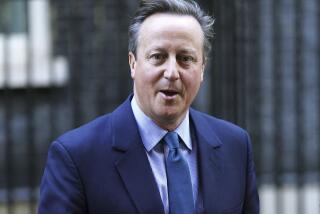British Foreign Secretary Hurd Retires : Politics: His surprise announcement comes a day after Major quits as Tory leader. Long-serving official pledges to support the prime minister.
- Share via
LONDON — Douglas Hurd, Britain’s long-serving foreign secretary, announced his retirement Friday but pledged his active support for Prime Minister John Major’s gamble to maintain the leadership of the ruling Conservative Party.
Hurd’s surprise decision came less than 24 hours after Major announced that he is moving up the date of the party leadership election among Tory members of Parliament from November to July 4.
Hurd, 65, who has been foreign secretary for six years, said he wants to “disentangle” himself as a possible target in the leadership fight--if one develops. Hurd said he will not resign his parliamentary seat and will remain an active “backbencher.”
Tony Blair, leader of the opposition Labor Party, declared that Hurd’s decision is “further proof that the Conservative government is in terminal decline.”
In opinion polls, the Labor Party is running far ahead of the accident-prone Tories, who have been governing Britain for the past 16 years.
Hurd’s announcement brought a flood of tributes for his performance as head of the Foreign Office--in a period when relations with the United States have cooled, talks with European Union members have often been heated and uncertainty has grown palpable about the role of Britain’s peacekeeping troops in Bosnia-Herzegovina.
“He made a remarkable contribution to the Cabinet, not a shadow of a doubt,” Major said.
Hurd’s successor will be named after he leaves, probably after the expected July reshuffle of Major’s Cabinet. Those mentioned as possible successors include: Defense Secretary Malcolm Rifkind, who is concerned with repairing Anglo-American ties; Home Secretary Michael Howard; Scottish Secretary Ian Lang, and Northern Ireland Secretary Patrick Mayhew.
Meanwhile, the “Euro-skeptics,” who have sharply opposed Major’s pro-European policies, were reported to be consulting on a possible candidate to oppose the prime minister.
The strongest individual appeared to be Norman Lamont, the former chancellor of the Exchequer, who has bitterly criticized Major’s economic and European policies.
Lamont, a former Major ally, declined to disclose his plans Friday but was reported to be strongly considering opposing the prime minister.
But Ron Gill, the chairman of Lamont’s parliamentary constituency, said it would be a “fatal mistake” for Lamont to run against Major.
As for the right-wing, anti-European members of Parliament who have been most vehement in their criticism of Major, they declined to say whether one or more of their number would enter the race.
Under party rules, candidates need only one member of Parliament to propose them and one to second their nomination. The nominations close at noon Thursday. If Major is opposed, the election by 327 eligible Tory members of Parliament will be held July 4.
*
Few political observers believe that any opposition candidate could defeat Major on the first ballot. But if enough lawmakers--a figure variously estimated from 80 to 100--oppose the prime minister or abstain, Major could be fatally weakened. A similar maneuver cost Prime Minister Margaret Thatcher the party leadership in November, 1990, and saw Major take over.
On Friday, Thatcher issued a statement declaring: “I fully support the prime minister and would vote for him if I were still a member of the House of Commons. I hope that the matter will be resolved by a ringing endorsement of the prime minister as soon as possible.”
Major said Friday his action was designed to end “fevered mutterings” about his party’s leadership that had “extinguished” the “real political agenda” of the government.
More to Read
Sign up for Essential California
The most important California stories and recommendations in your inbox every morning.
You may occasionally receive promotional content from the Los Angeles Times.











